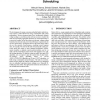Free Online Productivity Tools
i2Speak
i2Symbol
i2OCR
iTex2Img
iWeb2Print
iWeb2Shot
i2Type
iPdf2Split
iPdf2Merge
i2Bopomofo
i2Arabic
i2Style
i2Image
i2PDF
iLatex2Rtf
Sci2ools
108
click to vote
CASES
2003
ACM
2003
ACM
A control-theoretic approach to dynamic voltage scheduling
The development of energy-conscious embedded and/or mobile systems exposes a trade-off between energy consumption and system performance. Recent microprocessors have incorporated dynamic voltage scaling as a tool that system software can use to explore this trade-off. Developing appropriate heuristics to control this feature is a non-trivial venture; as has been shown in the past, voltage-scaling heuristics that closely track perceived performance requirements do not save much energy, while those that save the most energy tend to do so at the expense of performance—resulting in poor response time, for example. We note that the task of dynamically scaling processor speed and voltage to meet changing performance requirements resembles a classical control-systems problem, and so we apply a bit of control theory to the task in order to define a new voltage-scaling algorithm. We find that, using our nqPID (not quite PID) algorithm, one can improve upon the current best-of-class heurist...
Related Content
| Added | 05 Jul 2010 |
| Updated | 05 Jul 2010 |
| Type | Conference |
| Year | 2003 |
| Where | CASES |
| Authors | Ankush Varma, Brinda Ganesh, Mainak Sen, Suchismita Roy Choudhury, Lakshmi Srinivasan, Bruce L. Jacob |
Comments (0)

